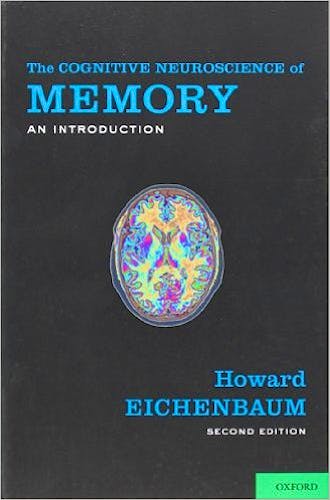

No hay productos en el carrito



The Cognitive Neuroscience of Memory: An Introduction
Eichenbaum, H.
2ª Edición Diciembre 2011
Inglés
Tapa blanda
418 pags
724 gr
16 x 24 x 3 cm
ISBN 9780199778614
Editorial OXFORD
LIBRO IMPRESO
-5%
75,75 €71,96 €IVA incluido
72,84 €69,19 €IVA no incluido
Recíbelo en un plazo de
2 - 3 semanas
About this Book
- Provides a useful introduction to the biology of memory for cognitive science and neuroscience students
- Organized to provide a background to the basic cellular mechanisms of memory and by the major memory systems in the brain
- Provides an up-to-date account of our understanding of how the brain accomplishes the phenomenology of memory
This clear and accessible textbook introduces the brain's remarkable capacity
for memory. The text was developed for undergraduate and beginning graduate
students, but it will also be of use to cognitive scientists, biologists, and
psychologists who seek an introduction to biological investigations of memory.
Like the first edition, this fully-updated second edition begins with a history
of memory research, starting with a 'Golden Era' at the turn of the 20th century,
and progressing to our current understanding of the neurobiology of memory.
Subsequent sections of the book discuss the cellular basis of memory, amnesia
in humans and animals, the physiology of memory, declarative, procedural, and
emotional memory systems, memory consolidation, and the control of memory by
the prefrontal cortex.
The book is organized into four sections, which highlight the major themes of
the text. The first theme is connection, which considers how memory is fundamentally
based on alterations in the connectivity of neurons. This section of the book
covers the most well studied models of cellular mechanisms of neural plasticity
that may underlie memory. The second theme is cognition, which involves fundamental
issues in the psychological structure of memory. This section of the book considers
the competition among views on the nature of cognitive processes that underlie
memory, and tells how the controversy was eventually resolved.
The third theme is compartmentalization, which is akin to the classic problem
of memory localization. However, unlike localization, the notion of "compartments"
is intended to avoid the notion that particular memories are pigeon-holed into
specific loci, and instead emphasize that different forms of memory are accomplished
by distinct modules or brain systems. This section of the book surveys the evidence
for multiple memory systems, and outlines how they are mediated by different
brain structures and systems.
The fourth and final theme is consolidation, the process by which memories are
transformed from a labile trace into a permanent store.
This text encapsulates the major concepts in the field of memory research, and
makes this area accessible to students who pursue a variety of related disciplines.
Readership: Undergraduate and early stage graduate students studying cognitive neuroscience or memory, as well as cognitive scientists, biologists, and psychologists
Contents
1. Introduction: Four themes in research on the neurobiology of memory
Section I. Connection - The cellular and molecular bases of memory
2. Neurons and simple memory circuits
3. Cellular mechanisms of memory: Complex circuits
Section II. Cognition - Is there a "cognitive" basis for memory?
4. Amnesia - learning about memory from memory loss
5. Exploring declarative memory in animal models
6. Windows into the workings of memory
Section III. Compartmentalization - Cortical modules and multiple memory
systems
7. The cerebral cortex and memory
8. Multiple memory systems in the brain
9. A brain system for declarative memory
10. A brain system for procedural memory
11. A brain system for emotional memory
Section IV. Consolidation - The fixation and organization of memories
12. Two distinct stages of memory consolidation
13. Working with memory
Final Thoughts
Glossary
Citations in figures
Author
Howard Eichenbaum, University Professor, Director of the Center for Memory and Brain, Director of the Center for Neuroscience; and Director of the Undergraduate Program in Neuroscience, Boston University, USA
Howard Eichenbaum is Director of the Center for Memory and Brain, the Cognitive Neurobiology Laboratory, and the Center for Neuroscience at Boston University
© 2025 Axón Librería S.L.
2.149.0